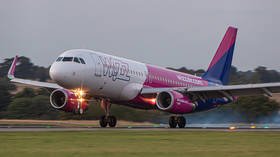EU to put blame for S.Ossetian war on Georgia?
The European Union commission investigating the five-day war in the Caucasus last August is to put most of the blame for the conflict on Georgian President Saakashvili.
However, Russian and South Ossetian participants are not lily-white either.
The commission headed by Swiss diplomat Heidi Tagliavini has established that the Georgian attack on South Ossetia was pre-planned and was not a response to “Russian aggression”, as Saakashvili has been claiming ever since, reports German newspaper Der Spiegel. It cites unpublished documents, which came into its possession.
Der Spiegel cites commission member Christopher Langton, a retired British Army colonel, as saying: "Georgia's dream is shattered, but the country can only blame itself for that."
The papers point out that the Georgian president had mentioned a military solution of the long-lasting conflict several times over the previous years. Before the war broke out, German Ambassador Uwe Schramm, who is deputy head of the EU investigative commission now, warned in his reports of Saakashvili's penchant for a war.
By August 7, the Georgian army had amassed 12,000 troops and 75 tanks on the border with South Ossetia. Georgian General Mamuka Kurashvili said that Tbilisi’s goal was to "re-establish constitutional order in the entire region." These words, aired on Georgian TV on the first day of the conflict, were probably a quote from an order, which the Georgian military failed to produce on the commission’s request, which several members tend to see as an admission of guilt.
While one commission member, Berlin journalist Jörg Himmelreich, condemns Russia’s counter-attack on Georgia as a “violation of international law,” others like Hamburg international law expert Otto Luchterhandt point out that the Georgian’s attacked the base of Russian peacekeepers, which allowed Russia to invoke the right of self-defense under Article 51 of the United Nations Charter.
However, the scale of the retaliation may be called disproportionate, the documents say. Moscow is also blamed for failing to prevent looting and killings in the Georgian villages in South Ossetia committed by Ossetian forces. The commission generally agrees that both Russian and Georgian troops failed to protect the civilian population in the region, as the Geneva Convention requires. For instance, they point at the use of cluster weapons, which kill indiscriminately and tend to leave unexploded charges in a wide area, further increasing the risk for the local population. Georgia has admitted using them, while Russia denies the accusations.
The final report of the commission is to be delivered in late July. Der Spiegel expects Tagliavini to avoid harsh judgments and probably leave the door open for Georgia as a potential NATO member. The newspaper also says the report will not mention the US and their military support of Tbilisi, despite some members arguing that it may have "inadvertently promoted Georgia's collision course."
The newspaper goes on to question why the commission would not investigate the diplomatic dialogue – or lack of it – between Moscow and Washington in the first hours of the conflict, when no one at the US State Department took a call from Russian Deputy Foreign Minister Grigory Karasin.
Neither do they plan to interview American diplomats like Daniel Fried, the Assistant Secretary of State responsible for Georgia at the time, who is quoted as saying privately that Saakashvili “went out of control” in August. According to one member of the commission, Tagliavini and “the EU apparently lack the courage" to take that step.
Georgia’s opposition agrees with the report, which is due to be published in the near future.
“Of course, we condemn Russia’s aggression against Georgia. But President Saakashvili, as the head of state, is politically responsible for failing to avoid this provocation. He drew the country into this war,” said Eka Beselia, leader of Movement for United Georgia.
And experts say official condemnation of Saakashvili could pull the plug on his rule.
Dr. John Laughland, director of studies at the Institute of Democracy and Cooperation, believes that the substance of the report is correct.
“Such a finding would destroy Saakashvili’s career, and maybe his life. It doesn't mean the West's strategic goals would be undermined. The West supported Shevardnadze for 10 years and decided when it was time for him to go. They'll try and do the same again,” Laughland says.













